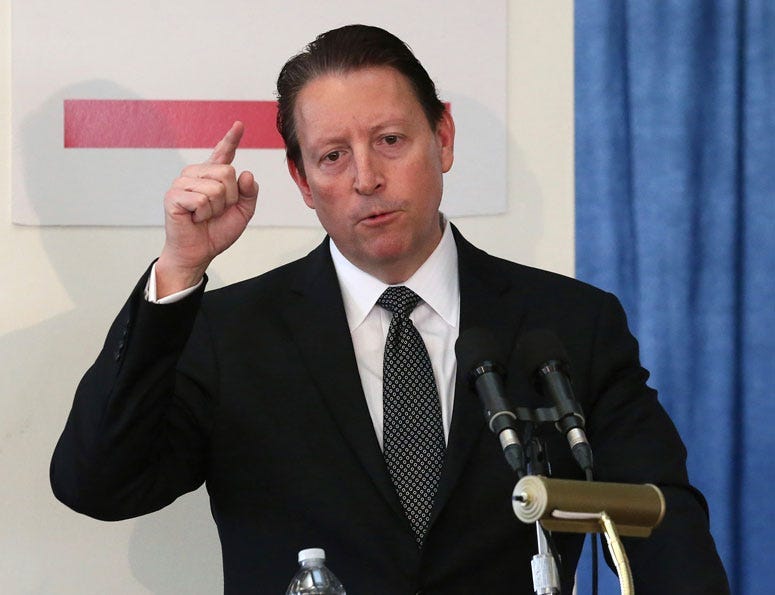
The Supreme Court struck down a 25-year-old federal law Monday known as the Professional and Amateur Sports Protection Act (PASPA) that largely outlawed sports betting outside Nevada.
Eventually, a plethora of sports-betting options could be open to fans -- including in-game betting -- and these are likely to come sooner rather than later.
The reality of the decision is likely to be seen in New Jersey before the end of the month. Those who legally want to make a sports bet in the Garden State will be able to drive down the Garden State Parkway toward the town of Oceanport and Monmouth Park.
This jewel of a racetrack will become the first spot in the country outside Nevada to legally offer sports betting in the United States on May 28, Memorial Day. After this happens, Delaware may be the next state to offer sports gambling, and other states – including New York and Connecticut -- will certainly follow like dominoes.
MORE: Chris Christie Discusses Ruling On 'Boomer & Gio'
Nearly 20 states have introduced legislation that could legalize sports betting, and the number could grow by another dozen within the next few years.
It’s difficult to say how much more money will be wagered on sports because of this ruling, but there will certainly be a growth in sports gambling advertising and sports gambling coverage on radio, television and all media.
This will lead to wide-ranging discussion and debate, and while those who are concerned about the integrity of sports will have their say, as will those who are concerned about how the proliferation of gambling will impact those participating, they are all likely to be outshouted by those who have the most to gain.
Dallas Mavericks owner Mark Cuban provided a strong hint after the announcement came down, saying that franchise owners in the Big Four sports will see their franchise values double.
MORE: Lichtenstein: Our Nation’s Refs Got The Call Right In NJ Sports Betting Case
But sports teams and leagues are going to want limitations on how far they are willing to get into bed with gambling. NBA commissioner Adam Silver has supported the marriage of his sport with gambling because of the additional revenue opportunities that will come. He will also be happy about having a chance to give the league's fans another opportunity to connect with the sport.
But while he may not have a problem with Angelo from Lake Ronkonkoma taking the Knicks +5 at home against the Celtics, would he really like to see Angelo making a bet on Jaylen Brown of the Celtics committing his second foul before the end of the first quarter?
Silver and other sports commissioners might feel confident about avoiding widespread team fixes from impacting the public’s perception, but what about the individuals in the sport? How will any of the powers that be know who is vulnerable to nefarious influences that play on the integrity of the sport?
The NFL has fueled this country’s passion for sports gambling more than any other entity. Nearly everyone has placed some kind of wager on the Super Bowl, and betting the point spread has been a national obsession for decades.
MORE: Q&A: What Sports Betting Ruling Means For Gamblers, Pro Leagues
But while the late commissioner Pete Rozelle once suspended a pair of stars in Green Bay running back Paul Hornung and Detroit defensive tackle Alex Karras for placing wagers on games with bookmakers, the league is in a position to benefit in a huge way from the legalization of sports gambling.
In-game betting may be the salvation for a sport that has seen its television ratings start to go the wrong way in recent years. The combination of cord cutting along with the CTE fears may be responsible for some people turning off the NFL on television, but the prospect of in-game betting could turn that around.
If Shirley from Cranford is tired of watching the Jets get pummeled after falling behind by 17 points at halftime in New England, she might decide to stay with the game if she can make a legal bet at halftime with the Jets getting another three points in the game.
Daily fantasy sports businesses DraftKings and FanDuel are both planning to jump into the sports betting world with both feet. They already have the infrastructure in place that takes in money and pays it out to clients, and those organizations seem likely to partner with established brick-and-mortar casinos to provide sports betting as well.
Decades ago, Las Vegas became a haven for gamblers, and that desert outpost was merely the starting point for the country’s obsession with gambling. States brought in lotteries, and then New Jersey, followed by other states, brought in casinos.
Legalizing sports betting is part of the expansion process. Fans will soon see a plethora of sports gambling advertising and coverage in the media, and the opportunity to bet on games legally.
Individual states are poised to enact their own regulations, but that seems a haphazard approach. A better way would be for Congress to establish a more uniformed approach to sports betting, which would be in the best interest of the leagues as well.
The debate will be loud, furious and nonstop in the months to come.
